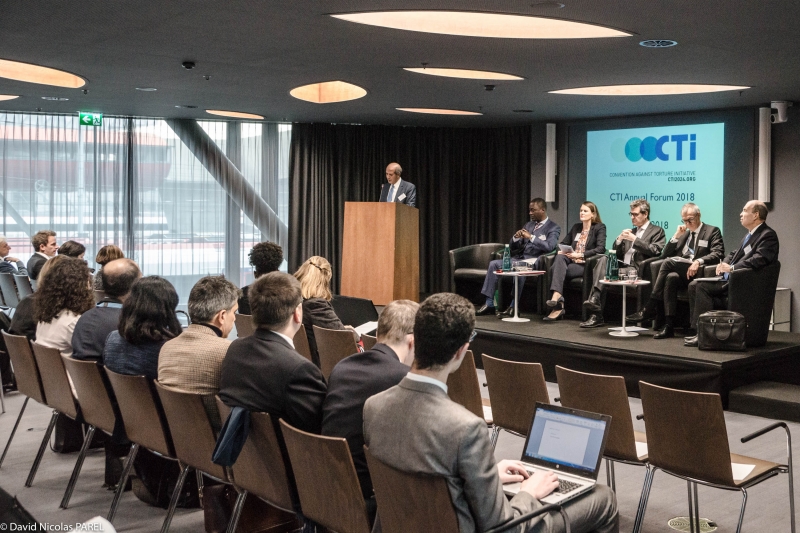A time for global solidarity against torture: CTI’s Annual Forum 2018
At CTI’s fifth Annual Forum, held last week on 29 November in Geneva, the international community was reminded of the continuing relevance of the Universal Declaration of Human Rights (UDHR) of 1948 and the absolute prohibition against torture it contains, 70 years after its adoption. CTI’s Annual Forum took stock of latest developments as well as new ways to tackle torture and ill-treatment. Over 60 participants joined in the discussions, made up of 27 States including 16 Ambassadors and Permanent Representatives, 11 international or non-governmental organisations and seven experts.

At a time when key international human rights norms are being questioned and in some situations, disregarded, CTI’s Annual Forum called for global solidarity and vigilance. Opening the Forum, H.E. Ambassador Hasan Kleib, Permanent Representative of Indonesia to the United Nations in Geneva and CTI Core State, noted that “Article 5 of the Universal Declaration was the UN’s first modern statement on the prohibition against torture and other cruel, inhuman or degrading treatment or punishment, and was adopted by consensus”. The United Nations Convention against Torture and Other Cruel, Inhuman or Degrading Treatment or Punishment (the Convention, or UNCAT), adopted subsequently, was drafted to give a specific voice to this issue, and provides a step-by-step guide on how to tackle it. For the CTI Core States, universal ratification of the Convention and its active implementation are fundamental building blocks to living in free and secure societies based on the rule of law.
UNCAT now enjoys the support of 165 States parties. Participants applauded the newest parties to the Convention that joined in 2018, namely the Republic of the Marshall Islands, the Commonwealth of the Bahamas and the Republic of The Gambia. Speaking from the floor, representatives of both the Bahamas and The Gambia thanked the CTI for their support in the lead up to ratifying the Convention. CTI’s five Permanent Representatives to the UN in Geneva of Chile, Denmark, Ghana, Indonesia and Morocco, underlined their governments’ commitments to support remaining non-State-parties to ratify UNCAT and reiterated their ambition of universal ratification by 2024.
In sharing the achievements of the past year, the CTI Ambassadors noted their appreciation for the CTI’s Group of Friends and partners. They noted that around 80 States represented at senior level had attended CTI events, covering issues such as safeguards in police custody and pre-trial detention, rapport-based investigative interviewing, rehabilitation of victims of torture, anti-torture legal frameworks, and the contribution of UNCAT implementation to the fair administration of justice. More than 50 good State practices were also documented in CTI’s two latest implementation tools.
A highlight of the event was an interactive dialogue, facilitated by Dr. Alice Edwards, Head of the CTI Secretariat. Reflecting on the achievements and progress made over the past 70 years, Professor Nils Melzer, UN Special Rapporteur on Torture, who examined this issue in his most recent report, spoke to the strong recognition of the absolute prohibition of torture at the time the UDHR was signed, and the “unprecedented efforts made by States and all stakeholders since then to make that prohibition a reality in law and practice.” He welcomed the approach of the CTI and congratulated the Initiative on its immense efforts to date. Also speaking on the panel, Dr Ferstman, Senior Lecturer at the University of Essex, stressed the “important role of civil society and NGOs, which over the past decades have built a global movement of solidarity against torture, have become more organised and coordinated, and which are today in dialogue with States, while maintaining their independence.”
While much has been achieved, important challenges remain. H.E. Ambassador Carla María Rodríguez Mancia, Permanent Representative of Guatemala to the UN in Geneva, and speaking on the panel, mentioned that raising awareness of the rights of citizens and building the capacity of public officials were foundational to changing mindsets. She also spoke about the need to regulate and capacitate private service providers performing a range of social functions such as prisons. Professor Melzer reinforced this point, noting that “some States still think that in some cases, there are benefits to torture, and that valuable information can be obtained from torture. We need to change these mindsets and how we think about torture, understanding that torture undermines our societies, and has no benefits.” The need to accept how damaging torture and abuse are for individuals, families and societies was repeated by several attendees, among them representatives of countries and victims groups with first-hand experience of torture, conflict and oppression.
Notwithstanding these various challenges, the Forum concluded with an optimistic outlook for the years to come. Much has been learned over the past 70 years on how to operate fairer justice systems, on methods of interrogation that are humane and effective, and on how rehabilitation and reconciliation can lead to sustainable peace. In his concluding remarks, H.E. Ambassador Zniber, Permanent Representative of Morocco to the UN in Geneva and CTI Core State, stated that “The CTI and our friends are advancing on the right track. With the mobilisation of all stakeholders, including civil society, we can overcome the remaining challenges to achieve our goals.”
For more information on the CTI, contact the CTI Secretariat at info@cti2024.org or by phone +41 (0)22 730 8639.
The event programme is available here.
Opening remarks by H.E. Ambassador Hasan Kleib, Permanent Representative of Indonesia to the UN in Geneva, are here.
Joint remarks by H.E. Ambassador Ramses Joseph Cleland, Permanent Representative of Ghana to the UN in Geneva, H.E. Ambassador Juan Eduardo Eguiguren, Permanent Representative of Chile to the UN in Geneva and H.E. Ambassador Morten Jespersen, Permanent Representative of Denmark to the UN in Geneva, “A View from CTI: Making progress on the 2018-20 Strategy” are available here. The accompanying PowerPoint is here.

